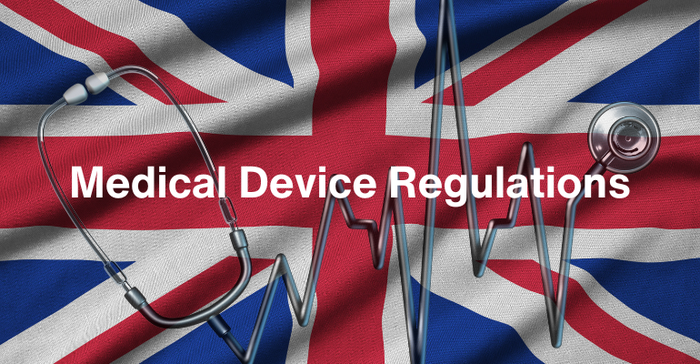The UK government is now aiming to implement new medical device regulations for the Great Britain market in July 2025.
May 4, 2023

The medtech industry will likely have more time than previously expected to adapt to new medical device regulations for the Great Britain market.
The Medicines and Healthcare products Regulatory Agency (MHRA), the first new body approved in the UK since Brexit, posted an update April 27 explaining that the government is now aiming for "core aspects" of the future regime for medical devices to apply from July 2025. This will support the ongoing safe supply of medical devices to Great Britain and ease the transition the future medical device regulations, according to the MHRA.
This means that, subject to Parliamentary approval, new legislation will be introduced before the end of June which will allow CE marked medical devices to be placed on the Great Britain market according to the following timelines:
General medical devices compliant with the EU medical devices directive (EU MDD) or EU active implantable medical devices directive (EU AIMDD) with a valid declaration and CE marking can be placed on the Great Britain market up until the sooner of expiry of certificate or June 30, 2028
In vitro diagnostic medical devices (IVDs) compliant with the EU in vitro diagnostic medical devices directive (EU IVDD) can be placed on the Great Britain market up until the sooner of expiry of certificate or June 30, 2030
General medical devices, including custom-made devices, compliant with the EU medical devices regulation (EU MDR) and IVDs compliant with the EU in vitro diagnostic medical devices regulation (EU IVDR) can be placed on the Great Britain market up until June 30, 2030
This will enable certain CE marked medical devices to continue to be placed on the Great Britain market for longer, the MHRA noted.

Class I medical devices and general IVDs under the directives, for which the conformity assessment under the EU MDD or EU IVDD did not require a notified body, can only be placed on the Great Britain market if the involvement of a notified body would be required under the EU MDR or IVDR (i.e., if it is an unclassified device or a reusable surgical instrument Class I device). Custom-made devices that are compliant with the EU MDD or EU AIMDD can no longer be placed on the Great Britain market.
If placing medical devices on the Great Britain market under these transitional measures, manufacturers will not be able to rely on expired certificates (unless such certificates have been otherwise deemed valid by the EU), the regulatory agency noted.
The government also intends to introduce legislation later in 2023 that will bring into force strengthened post-market surveillance requirements ahead of the wider future regulatory regime. This reflects the government’s priority of improving patient safety as part of the future medical device regulations. These post-market surveillance requirements are expected to apply from mid-2024.
The agency said the government also intends to make a further amendment in the future. This will provide that, once the future regime for medical devices is in place, it will not be possible to rely on EU MDR or EU IVDR CE certificates that are renewed after the future regime fully applies (from July 2025) for placing medical devices on the Great Britain market.
The MHRA said it is working with industry, trade associations, and the broader medical devices community to support the effective implementation of the new regime. The regulatory changes will be accompanied by guidance to support the medtech sector in the interpretation of the new medical device regulations, the agency noted.
Medical device regulations webinar
"Delivering a regulatory framework for the UK is clearly more than providing a set of regulations," said Penny Wilson, deputy director of innovative devices at MHRA, during a January webinar covering medical device regulations (see recording below). "We need to provide guidance and maximize the opportunity afforded to the MHRA following the UK's departure from the European Union. The MHRA is committed to playing its part with stakeholders across the UK and internationally to provide an agile, patient-focused regulatory framework that will make the MHRA a global leader in device regulation and will also support innovation."
With regards to the Great Britain market in particular, Jillan Hussein, a devices regulatory specialist at the MHRA, said during the webinar that the agency does recognize that patients will only benefit if people are prepared to develop and market their medical devices in the UK.
"We want to ensure that UK patients are not put at risk by supply disruptions," Hussein said, adding that the timeline for implementation of these medical device regulations "is a moving picture" (as evidenced by the recent proposal to push the future regime for medical devices to apply from July 2025).
Post-market surveillance requirements
During the January webinar, Hussein offered an overview of what post-market surveillance (PMS) requirements will look like in the UK.
"The new PMS requirements will require proactive patient safety monitoring and increase reporting of adverse incidents to the MHRA, improving the ability of both the manufacturer and the MHA to identify issues with medical devices placed onto the UK market and, when necessary, take appropriate action to safeguard public health so the statutory instrument on the future medical device regulations will look to bring into force the wider regime," Hussein said.
As of January 24, the date of the webinar, the MHRA was expecting to roll out the post-market surveillance requirements this summer. However, under the EU-UK Trade Cooperation Agreement, technical regulations are subject to a six-month implementation period between the publication of the final regulations and the regulations being enforced. So, Hussein said, the PMS requirements will be subject to a six-month implementation period.
"Therefore, we expect the PMS requirements to come into force within quarter one of 2024," Hussein said. "However, as I mentioned ... this is a moving picture and we are working at pace to provide you with the certainty you need, and we'll keep you updated as this work progresses."
Hussein also emphasized the importance of the MHRA working with industry partners to ensure that the agency understands the challenges manufacturers face so that as the MHRA crafts the new regime it understands the barriers that get in the way of patients receiving the products they need. The agency will also work with other regulators to support access and develop alternative routes to market, she said.
Wanted: more designated approved bodies for medical devices in the UK
Also, during the January webinar, Suzanne Fuller, interim head of approved bodies and proactive market surveillance at the MHRA, explained the process for approving bodies for medical devices in the UK.
Currently there are four designated approved bodies for medical devices in the UK.
"We recognize there is a need to significantly grow capacity in the approved body sector," Fuller said. "We've already begun that work ... however, we know that there is a lot more to be done, and this has been particularly challenging to achieve in parallel with changing regulatory frameworks in both the UK and the EU."
She noted that the requirements for approved bodies for medical devices are set out in both the UK medical device regulations and, more specifically, in regulation 920/2013.
"We can only designate organizations that are able to demonstrate compliance with these regulatory requirements," Fuller said. "That said, we're taking a pragmatic and flexible approach to designation. We want to avoid creating unnecessary duplication whilst ensuring that we build a strong and independent UK system."
For example, one requirement for UK approved bodies is to be a distinct legal entity based in the UK whilst permitting the sharing of resources and personnel conformity assessment bodies in a wider global group, Fuller said.
"Perhaps [to] the outside world it may not appear that there's been much activity in this area however, the team [is] working very hard on processing the applications that we have received," Fuller said.
There are six stages to the designation process for approved bodies.
Stage 1: Pre-submission
At this stage, Fuller and the team will spend time meeting with organizations that want to apply to become an approved body. The meeting will include laying out what the MHRA's expectations are, what the applicant would need to submit to support their application, and ensuring the applicant understand the requirements for being an approved body.
Stage 2: Application submission
"Once an organization has assembled all the relevant information – and we understand this can be quite a substantial amount of documentation – we will agree on a date with them when they submit their application and that supporting documentation," Fuller said. "The MHRA team will then undertake a completeness check of the documentation to make sure that everything that's required has been submitted."
Stage 3: Application review
During the application review phase, the MHRA does an in-depth review of all the documentation and the competency records to assess whether the organization has the correct expertise required to undertake the conformity assessment for the types of medical devices for which they have applied.
Fuller said the agency will also review all the applicant's procedures and its organizational structure and how it intends to manage applications for medical device certification.
"If necessary, we will have further meetings with applicant organizations if we require further clarification from them or if we think we need more information," she said.
Stage 4: Designation audit
During the designation audit, the MHRA will audit the applicant organization against four key areas: organizational and general requirements (legal structure, liability insurance, impartiality, and financial sustainability of the organization); quality management system; resource requirements (this relates to both the capacity of the applicant and the competence of the personnel and how they are managed within the organization to ensure that the approved body has appropriately qualified personnel and the capacity to take on the additional work); and process (including procedures for undertaking conformity assessment of an application submitted by a manufacturer, as well as ongoing surveillance activities).
"It's usually quite an intense process and this is our opportunity to clarify any areas that we've identified where we have further questions and assess how effectively these processes and procedures have been implemented," Fuller said.
Stage five: Post-audit
During the post audit phase, the agency will respond to and address any non-conformities raised during the designation audit. Once these have been satisfactorily addressed with supporting evidence provided, the MHRA will do a follow-up assessment to close out those non-conformities and verify that any changes that have been required have been appropriately implemented.
Stage six: Designation decision
Finally, a recommendation will be made to the MHRA approved body panel, which will make the ultimate decision regarding designation.
"That's just a high-level overview of the process that we go through, and hopefully it gives you a sense of the detail and the rigor that we apply," Fuller said. "The question that we're probably asked the most is, 'how long does it take?' It's very difficult to answer this as it depends on a number of factors including the scope for which an organization has applied, the number and the nature of any non-conformities raised during the audit, and how long it takes to close out those issues."
Any new organization that applies to become an approved body after the new medical device regulations have been implemented will be assessed against these new requirements, Fuller said. However, she said organizations that are already designated as an approved body will not be required to apply for re-designation when the new regulations come into effect, she said.
"So, essentially, their designation will roll over," she said. "This should enable designated approved bodies to focus on implementing the requirements of the new regulations without the need to go through another in-depth designation process."
About the Author(s)
You May Also Like




